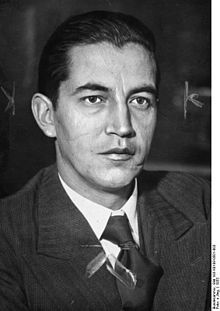 |
Rudolf Diels was the first chief of the Gestapo (GeheimeStaatspolizei). Whereas it might be natural to see figures such as Himmler , Heydrich or Goering as being the first chiefs of such a feared organisation, its first leader was, in fact, the little known functionary Diels.
Rudolf Diels was born in December 16th 1900. He attended the University of Marburg where he studied law and where he gained a reputation for his drinking.
However, such a reputation did not stop Diels from advancing up the ladder of power within Prussia. In 1932, Diels testified in front of a federal court that the socialists in Prussia had attempted to form an alliance with the communists in the state in an attempt to seize power. This was completely untrue but the court believed Diels and the socialists were removed from power while Diels was appointed an assistant minister.
After Hitler gained power in January 1933, he appointed Goering as head of the Prussian state government. Goering was impressed with the work Diels had done within the city’s police force. It was Diels who convinced Goering that the state needed a secret police force to keep a close eye on those within the state who wanted to do Prussia harm. Goering agreed and in June 1933, he appointed Diels as chief of Department 1A in the Prussian state police force. This was the start of what was to become the Gestapo.
It was Diels who was the main interrogator of Marius van der Lubbe, the man accused and ultimately executed for the Reichstag Fire.
In April 1934 Diels was dismissed from his post – Goering had lost a power struggle with Himmler within the state and Himmler wanted to remove anyone who he deemed was one of Goering’s men. This included Diels.
Diels used Goering as a lever to gain other positions within Nazi Germany. He became administrative president of Köln.
Diels was arrested after the failed 1944 July Bomb Plot and put in a Gestapo prison. He survived his time in prison and survived the war. After the war he worked in the government of Lower Saxony. However, he was killed in a hunting accident in November 1957.
September 2012